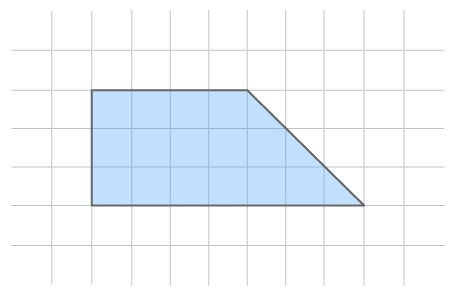Is this figure a parallelogram? Explain why or why not.
A trapezoid is not a parallelogram because (any of the reasons below):
-It only has one pair of parallel sides
-Opposite angles are not equal.
Which measurement would we NOT use to find the area of this parallelogram? Why would we not use it?

We wouldn't use the 4.
-It forms an obtuse angle with the 8 side.
-It forms an acute angle with the 3 side.
What is the formula for area of a triangle?
Area = b • h/2 OR A = 1/2 • b • h
What is the area? 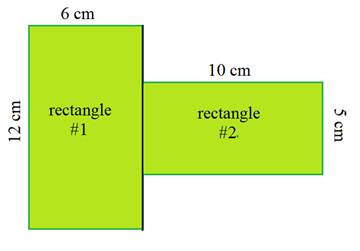
#1: 12 • 6 = 72
#2: 10 • 5 = 50
TOTAL: 72 + 50 = 122 u2
What is "area"?
How do we find the area of any parallelogram? (What is the formula?)
Area = base • height
What are the measurements of the base and height of this parallelogram? Explain your reasoning.
height = 6
These are the measurements needed to find the area because these two lines form a right angle. 7.5 forms an acute angle with the 9 side so it cannot be included.
Why do we ALWAYS divide by two when finding the area of a triangle?
What is the area of the shaded region? 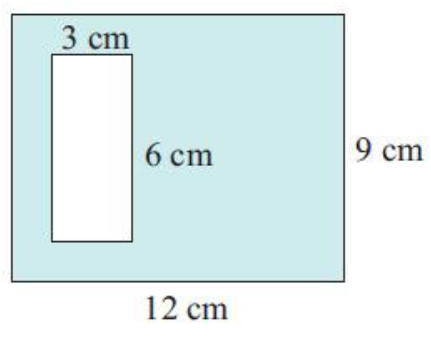
81 - 18 = 63 u2
The base of a triangle is 10 units, and the height is 8 units. What is the area?
40 u2
What is the area?
90 square units
How do you determine the height of a shape? (Where do you start and end?)
From the base to the highest point of the shape!
Student work:
A = (b • h)/2
A = (4 • 3)/2
A = 12 u2
Is the student correct? Why or why not?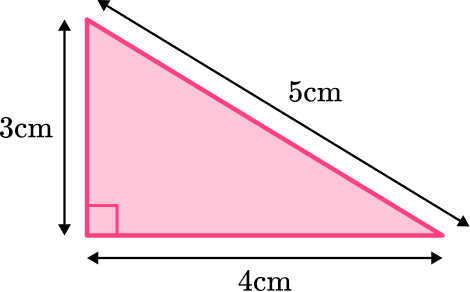
The student is incorrect! They did not divide by 2. The answer should've been 6 u2.
Find the area using DECOMPOSING and REARRANGING.
Decompose one of the triangle pieces and rearrange them so that they turn the whole shape into a rectangle.
11 • 3 = 33 u2
Describe what this person did to solve the area of the large triangle:
They decomposed and rearranged it to make two squares.
What is the area?
24 square units
TRUE OR FALSE: Any side can be a base, even if it is slanted or on the side.
True!
What is the area?
b= 7 ; h = 4
(7 • 4)/2
28/2
A = 14 u2
What is the area of the shaded region? 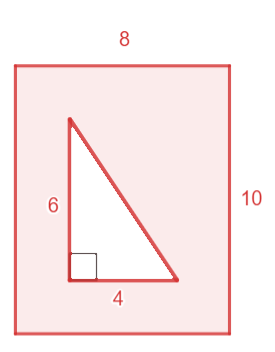
80 - 12 = 68 u2
Do these two parallelograms have the same area? Explain your reasoning. 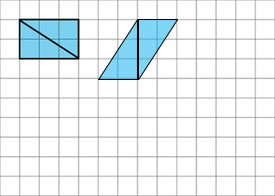
Yes! They both have an area of 6 square units. Rearranging shapes does not change the area.
The area of a parallelogram is 60 sq. units. If the base was 12 units, what must the height be?
5 units.
12 • 5 = 60 u2
Which images have the bases and heights labeled INCORRECTLY? Explain how you know.
C: Base and height are not even touching. Therefore, do not form a right angle. The base should be at the top.
E: The base and height come together and make an acute angle.
What must the height be if the area of the triangle is 30 u2?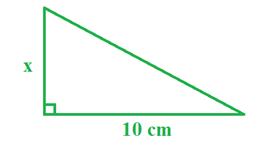
h= 6
(10 • 6)/2
60/2 = 30 u2
What is the area? Use the formula for the area of a triangle!
Rectangle:
A = 4 • 3 = 12 u2
Triangle:
A = (3 • 3)/2 = 4.5 u2
12 + 4.5 = 16.5 u2
Find the area of the triangle:

(12 • 4)/2
48/2 = 24 u2


